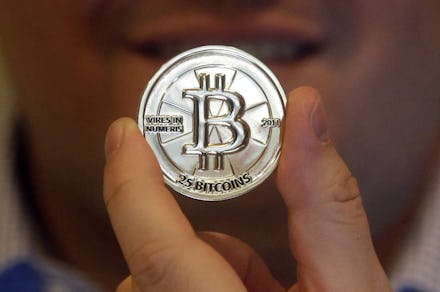Bitcoin Startups Are Hot Right Now, But You Should Be Skeptical About the Hype

If you've been plugged into bitcoin news at all, you probably already know that things just got real.
As reported last week by virtually every tech news related outlet (including TechCrunch and New York Times Dealbook), some big names in the tech world have piled onto the latest fundraising round for Coinbase, the San Francisco-based bitcoin startup that's working hard to help the somewhat-confusing digital currency transition into the consumer mainstream. It has received $25 million in financing so far. These names include two titans in the venture capital world — Chris Dixon of Andreessen Horowitz and Fred Wilson of Union Square Ventures — and the Bitcoin Foundation's Gavin Andresen, otherwise known as the guy who "Satoshi Nakamoto," the creator of Bitcoin who probably isn't real and whose identity remains a mystery to this day, nominated as Bitcoin's torch-bearing successor.
Why Coinbase? The bitcoin startup sphere is positively booming at the moment, with bitcoin companies popping up everywhere like mushrooms. A rudimentary Angel List search for bitcoin companies reveals just over 200 companies dealing with the digital currency in some way or another. What makes Coinbase special? Why has it captured the attentions and wallets of these tech titans? And why should we pay attention to them?
Simple: Coinbase makes the experience feel absolutely, positively normal — and it is in this cultivated normalcy that we should invest close attention. The service does two things very well. Firstly, it hides the complexity of the entire transaction, very much in the same way conventional banking or stock market trading hide the complex financial ecosystem supporting them. This obscuring of complexity invokes a thought process along the lines of "Action A causes effect B; what's so complicated about that?" And as with the case of banking and financial markets, it is actually pretty darn complicated, but the ecosystem as a whole doesn't benefit from your prognostications about the system's complexity.
Secondly, Coinbase normalizes the whole interaction by mimicking a conventional foreign exchange trade. It utilizes the visual and interaction language instilled into us by conventional banking, and by closely replicating the feeling of using, say, Scottrade to buy out a stock, it compels users to perceive the bitcoin experience as simple and familiar.
The thing that fuels bitcoin hesitancy is the fear of the unknown. The great majority of us who aren't highly skilled computer programmers or mathematicians typically find it supremely difficult to wrap our heads around how bitcoins are created, how they are managed, or even what they are. Surely, this must explain the wealth of "Bitcoin Easily Explained" articles that currently populate the web. (For good examples of such articles, go here and here and here). It appears that the folks behind Coinbase acutely understand this, and their attempts to normalize what is a very bizarre technological product quite possibly constitute the "killer app" move that bitcoin advocates have long been seeking.
So here's the thing we should be wary about: If Coinbase proves successful in lulling us into accepting bitcoins as a perfectly acceptable consumerist convention, then we'd be integrating into our financial lives something whose prime critical components we still do not understand. Think about it. We don't even know something as basic as who actually created the bitcoin. You may have read as many "Bitcoin for Dummies" articles as you possibly could, but do you really understand it? Or are you merely relying on the attestations of people you have trusted as far more intelligent than you?
At the end of the day, we would be committing a more heightened version of a sin that we've been blissfully committing with conventional money. We don't quite understand how it works, and yet we build our lives around it. The names and details are certainly different, but the core quandary remains the same.
Venture capitalist investments and development efforts in Coinbase constitute great strategic logic. Its goal to normalize bitcoins makes wonderful business sense — if successful, a lot of people are going to make financial killings off of it, and the population of billionaires in Silicon Valley will go up by at least one.
But the rest of us? Us non-techie peons in the physical world? We would be living in a world fundamentally more confounding than the one we live in now. I'm not saying that we should distrust the bitcoin as financial concept. That would be intellectually dishonest in the vein of the Luddites. Rather, I'm saying that we should treat bitcoins the same way we treat people who call us up to sell an idea of salvation — with skepticism, an understanding of the big picture, and no small amount of snark.